Index relies entirely on the support of donors and readers to do its work.
Help us keep amplifying censored voices today.
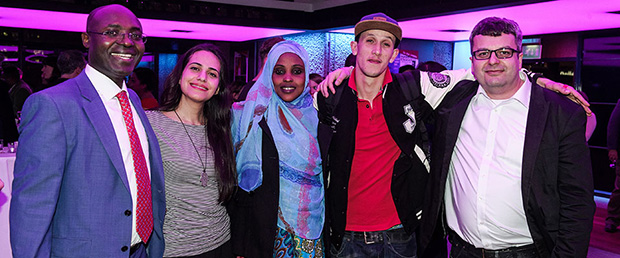
Rafael Marques de Morais, Safa Al Ahmad, Amran Abdundi, Mouad “El Haqed” Belghouat and Tamas Bodokuy (Photo: Alex Brenner for Index on Censorship)
A Kenyan woman standing up for women’s rights in one of the world’s most dangerous regions. A Hungarian journalist and his investigative news site. A documentary filmmaker who exposed an unreported uprising in Saudi Arabia. An Angolan journalist who has been repeatedly prosecuted for his work uncovering government and industry corruption. A Moroccan rapper whose music tackles widespread poverty and endemic government corruption.
These were the five individuals named Index on Censorship Freedom of Expression Award winners on 18 March 2015. Three months later, here are updates on their ongoing work.
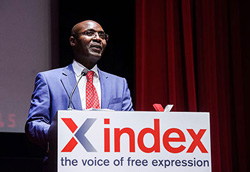
Rafael Marques de Morais (Photo: Alex Brenner for Index on Censorship)
International signatories, from Tiffany & Co and Leber Jewellers to Oscar-winning film director Steve McQueen, and from Blood Diamond film stars David Harewood and Michael Sheen to journalist Sir Harold Evans, recently called on Angolan president José Eduardo dos Santos to abandon the prosecution of investigative journalist Rafael Marques de Morais.
The campaigning journalist returned from collecting his award in London to face trial linked to his book Blood Diamonds. He filed a criminal complaint against a group of generals who he held morally responsible for human rights abuses he uncovered within the country’s diamond trade. For this, they filed a series of libel suits against him in Angola and Portugal.
The media attention that Marques won off the back of his award “helped a great deal” he said. “It raised my profile in the days before my trial and maybe helped to make it an international cause.” In a rare sight for Angola, a number of anti-corruption protesters publicly gathered outside of the Luanda courthouse as his trial opened and covert protests have continued under the cover of darkness since.
Marques’ trial played out in a Kafkaesque way over the subsequent weeks, with behind-the-scenes negotiations leading to criminal defamation charges first being dropped, only for him to suddenly discover that he would instead be sentenced for the alternative crime of malicious prosecution.
The American Bar Association, who monitored the trial throughout, published a report stating that the court had failed to meet international fair trial standards on at least three counts. The ABA Center for Human Rights report found that “throughout the proceedings, the defendant was denied the right to present a defense, induced to make a statement on the basis of false pretenses and compelled to bear the burden of proving his innocence, all in violation of international law.”
Marques’ sentence finally came down on 25 May: six-months imprisonment, suspended for a term of two years. Marques is now appealing against this punishment that effectively seeks to silence him until 2017; coincidentally the same year as Angola’s next elections.
The court also attempted to censor Marques’ book from republication and further distribution but these efforts have blatantly failed with copies of the book widely circulated online and an English language version becoming available for the first time less than a week after his sentence.
Despite the international attention, the situation for Marques and his peers in Angola’s human rights and journalism communities remains grim. Recounting the experience of taking his car to the local garage for repairs recently, the fear is palpable in his voice. “There were two members of the ruling party there, by coincidence. They walked across to the mechanic and warned him not to fix my car unless he wanted to risk becoming collateral damage.”
Marques’ email has also recently been repeatedly hacked and his website www.makaangola.org is presently subject to over 250 attacks per day, forcing him to desist from updating it for the time being.
Marques continues to work closely with Index on Censorship and a number of other international organisations. His recent report on the massacre of a sect at Mount Sumi was published by The Guardian, he continues to keep a close eye on both the persecution of journalists and corruption at the highest levels in Angola, and he is expecting to hear back from the Supreme Court about his appeal in the next few weeks.
Hugely grateful for the support of the international community, Marques remains determined “to continue the good fight for change”.
“I have only the interests of my people at heart,” he says, “and to experience all this persecution, it must mean you are doing something positive, something right.”
• Blood Diamonds: Corruption and Torture in Angola
• MakaAngola.org
• Philip Pullman, Jimmy Wales, and Steve McQueen join call for Angola to drop charges against investigative journalist
• Angolan journalist Rafael Marques de Morais receives six-month suspended sentence
• Rafael Marques de Morais: “They can lock me up, but they don’t get to silence me”
• Index condemns decision to move for conviction of Rafael Marques de Morais
• Rafael Marques de Morais: I believe in the power of solidarity
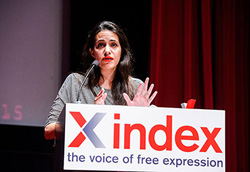
Safa Al Ahmad (Photo: Alex Brenner for Index on Censorship)
Joint winner of the Index on Censorship Freedom of Expression Award for Journalism, Safa Al Ahmad has spent much of the past three months in the editing studio.
Applauded for her documentary Saudi’s Secret Uprising, Al Ahmad’s new film The Rise of the Houthis – first distributed at this year’s Index on Censorship Freedom of Expression Awards Gala and since screened by both the BBC and PBS Frontline – has won wide critical acclaim.
In it, Al Ahmad gained extraordinary access to tell the story of the rise of a rebel group from the north of Yemen who have taken over control of the capital Sana’a and drastically changed the country’s political landscape.
Next month, on 6 July, BBC worldwide will also premiere a follow-up film that Al Ahmad has produced and directed, with Gaith Abdulahad exploring the present situation in the south of Yemen.
Now regularly invited to attend international public meetings, from Copenhagen to Geneva to Washington DC, Al Ahmad says she thinks that the award has brought more exposure – both for credible investigative journalism from Saudi Arabia, and for her work.
Is that a good thing for a journalist who has made her name through operating undercover? It is a challenge, she says, to find ways to do credible journalism about Saudi Arabia and the region without being on the ground. But there are complex stories, beyond TV, that Al Ahmad would increasingly like to focus on.
• Safa Al Ahmad on YouTube
• Safa Al Ahmad: Facts are a precious commodity in Saudi Arabia
• #IndexAwards2015: Journalism nominee Safa Al Ahmad
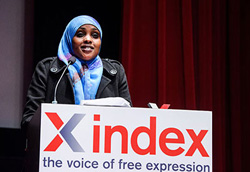
Amran Abdundi (Photo: Alex Brenner for Index on Censorship)
It wasn’t long after women’s rights campaigner Amran Abdundi returned to her native northern Kenya that Al-Shabaab linked terrorists attacked Garissa University College, killing 148 people in a cold-blooded massacre.
Abdundi, who knows many students from the college, immediately joined with other women leaders to organise strong community protests against Al-Shabaab.
“It was a barbaric attack done by a crazy group who have no respect for human life,” she said. “It was a sad day for the people of Kenya and the victims of the attack. But it will not scare [the] people of northern Kenya as we will continue and fight to overcome them”.
Abdundi hopes to help further through her ongoing work with her grassroots community organisation Frontier Indigenous Rights Network, tracking arms movements across the dangerous border with Sudan and travelling to meetings in Nairobi to report observations. “Security is improving now,” says Abdundi.
Winning the Index on Censorship Freedom of Expression Award for Campaigning, and sharing the story of the people of northern Kenya with the wider world, “made me so happy” she says. “The award ceremony was aired by all community radios in northern Kenya and reached many people. I am happy because it will give women courage to stand up for their rights”.
Spending a week in Index on Censorship’s office in London was “an opportunity to see how you work” Abdundi said, and has inspired her to want to develop a new website for her work, helping her to “spread her message to all corner[s] of northern Kenya”.
• Amran Abdundi: This award is for the marginalised women of northern Kenya
• #IndexAwards2015: Campaigning nominee Amran Abdundi
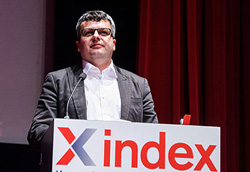
Tamas Bodoky (Photo: Alex Brenner for Index on Censorship)
Atlatszo.hu, Tamas Bodoky’s investigative news website in Hungary has continued to gather praise and acclaim, including another award, the Theodor Heuss Medal.
“All of this recognition is very helpful,” said Bodoky. “We are always afraid of retaliation and this offers us a level of protection… Hungarian authorities are very aware of this international attention and it is less likely that they will attack as we continue with our investigative projects.”
Atlatszo continues to publish three to four articles and numerous blog posts each week, including an English newsletter, often drawing on FOI requests to try to bring more transparency to Hungarian public life.
The campaigning journalists scored a major recent success with their campaign to demand political party foundations make information on their beneficiaries, income and spending publicly available. When political party Jobbik’s foundation refused to comply, Atlatszo took action. It began legal proceedings that proved sufficient to make them capitulate.
Bodoky’s organisation is now using this newly available information to research deeper, exploring “far right networks” and, he says, some curious connections between governing party Fidesz and football club Ferencvarosi TC.
Other recent work “the hammer of the village series” is on local municipalities and the public procurement process, with Bodoky seeking to tackle the “local state capture situation” whereby connections between elected council members and big business are “worrying”. And there are Atlatszo’s ongoing investigations into the spending of European funds. “We have to be a watchdog” says Bodoky.
As he looks ahead, Bodoky is especially concerned by the looming threat of a foreign NGO law – holding all NGO’s with foreign funding “accountable and transparent” by forcing them to register.
“We don’t know exactly when they will seek to expose and limit foreign funding, but the Russian recipe is definitely on the table,” says Bodoky. Fortunately his organisation has been totally open and transparent since 2013.
• atlatszo.hu
• Tamas Bodoky: The independence of journalism in Hungary is under threat
• #IndexAwards2015: Digital activism nominee Tamás Bodoky and Atlatszo.hu
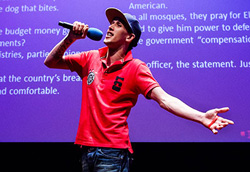
Rapper El Haqed (Photo: Alex Brenner for Index on Censorship)
Rapper Mouad Belghouat, better known as El Haqed (“the enraged” in Arabic) continues to rail against the endemic corruption and widespread poverty he says he sees in Morocco.
Imprisoned three times since 2011, El Haqed was not only prohibited from performing publicly in his homeland but had also been struggling to obtain visas to travel or perform internationally.
The good news is that his visit to the UK has helped him to overcome this obstacle, recently spending five weeks touring Norway, Sweden and Denmark. Highlights included performing live during Oslo’s 1 May celebrations and working with the organisation Freemuse to record a new Fela Kuti cover as part of a group of Arab and Iranian revolutionary artists (listen here). “It was much easier to be there because I went to England and came back,” said Belghouat.
Until recently limited to publishing and sharing his work via YouTube and Facebook, El Haqed has also begun something of an offline resurgence back home. Approached by promoters in his home town of Casablanca after winning the Index on Censorship Freedom of Expression Arts Award brought him widespread local media coverage, El Haqed now hopes to stage his first live concert on home soil in a long time this Friday 19 June. (Update 22 June 2015: Morocco: Police block concert by Index award-winning rapper El Haqed)
“Usually people find many excuses not to work with him,” according to Belghouat’s brother and manager Abderrahim Belghouat, “but so far this time no people have yet come and told the venue ‘don’t work with him’…”
Update 23 June 2015: El Haqed has now cancelled his planned tour of five of Morocco’s least affluent towns. The planned series of concerts would have teamed El Haqed with six other local musicians to “bring joy to poorer people in cities without theatres, cinemas and cultural areas, in the old Moroccan way, by making music for free outdoors”.
El Haqed is determinedly hopeful, “the Index award has shown Moroccan authorities that you can’t stop me,” he said, “the more of an effort they make to silence me, the more my voice arrives everywhere.”
• El Haqed on YouTube
• El Haqed: I will fight for freedom, equality and human rights for ever
• #IndexAwards2015: Arts nominee Mouad “El Haqed” Belghouat
• Index calls on Morocco to release rapper El Haqed
• Index announces winners of 15th annual Freedom of Expression Awards
• Rafael Marques de Morais: I believe in the power of solidarity
• Amran Abdundi: This award is for the marginalised women of northern Kenya
• El Haqed: I will fight for freedom, equality and human rights for ever
• Tamas Bodoky: The independence of journalism in Hungary is under threat
• Special Index Freedom of Expression Award given to persecuted Azerbaijani activists and journalists
• Video: Comedian Shappi Khorsandi hosts Index on Censorship awards
• Drawing pressure: Cartoonists react to threats to free speech
Governments don’t really like coming across as authoritarian. They may do very authoritarian things, like lock up journalists and activists and human rights lawyers and pro democracy campaigners, but they’d rather these people didn’t talk about it. They like to present themselves as nice and human rights-respecting; like free speech and rule of law is something their countries have plenty of. That’s why they’re so keen to stress that when they do lock up journalists and activists and human rights lawyers and pro-democracy campaigners, it’s not because they’re journalists and activists and human rights lawyers and pro-democracy campaigners. No, no: they’re criminals you see, who, by some strange coincidence, all just happen to be journalists and activists and human rights lawyers and pro-democracy campaigners. Just look at the definitely-not-free-speech-related charges they face.

Khadija Ismayilova is one of the government critics jailed ahead of the European Games.
Azerbaijani investigative journalist Khadija Ismayilova was arrested in December for inciting suicide in a former colleague — who has since told media he was pressured by authorities into making the accusation. She is now awaiting trial for “tax evasion” and “abuse of power” among other things. These new charges have, incidentally, also been slapped on a number of other Azerbaijani human rights activists in recent months.
Belorussian journalist Irina Khalip was in 2011 given a two-year suspended sentence for participating in “mass disturbance” in the aftermath of disputed presidential elections that saw Alexander Lukashenko win a fourth term in office.
Chinese dissident Zhu Yufu in 2012 faced charges of “inciting subversion of state power” over his poem “It’s time” which urged people to defend their freedoms.
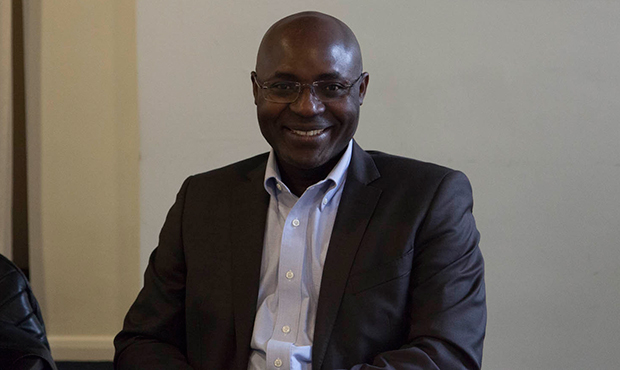
Journalist and human rights activist Rafael Marques de Morais (Photo: Sean Gallagher/Index on Censorship)
Rafael Marques de Morais, an Angolan investigative journalist and campaigner, has for months been locked in a legal battle with a group of generals who he holds the generals morally responsible for human rights abuses he uncovered within the country’s diamond trade. For this they filed a series of libel suits against him. In May, it looked like the parties had come to an agreement whereby the charges would be dismissed, only for the case against Marques to unexpectedly continue — with charges including “malicious prosecution”.
Kuwaiti blogger Lawrence al-Rashidi was in 2012 sentenced to ten years in prison and fined for “insulting the prince and his powers” in poems posted to YouTube. The year before he had been accused of “spreading false news and rumours about the situation in the country” and “calling on tribes to confront the ruling regime, and bring down its transgressions”.

Nabeel Rajab during a protest in London in September (Photo: Milana Knezevic)
In January nine people in Bahrain were arrested for “misusing social media”, a charge punishable by a fine or up to two years in prison. This comes in addition to the imprisonment of Nabeel Rajab, one of country’s leading human rights defenders, in connection to a tweet.
In late 2014, Saudi women’s rights activist Souad Al-Shammari was arrested during an interrogation over some of her tweets, on charges including “calling upon society to disobey by describing society as masculine” and “using sarcasm while mentioning religious texts and religious scholars”.
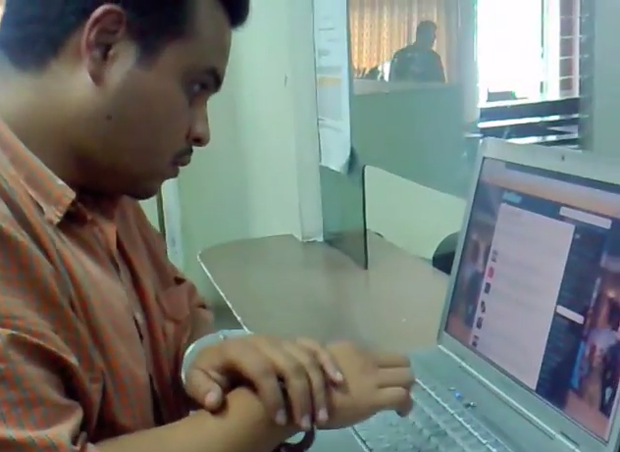
(Image: Oscar Mota/YouTube)
Jean Anleau was arrested in 2009 for causing “financial panic” by tweeting that Guatemalans should fight corruption by withdrawing their money from banks.
Swazi Human rights lawyer Thulani Maseko and journalist and editor Bheki Makhubu in 2014 faced charges of “scandalising the judiciary”. This was based on two articles by Maseko and Makhubu criticising corruption and the lack of impartiality in the country’s judicial system.
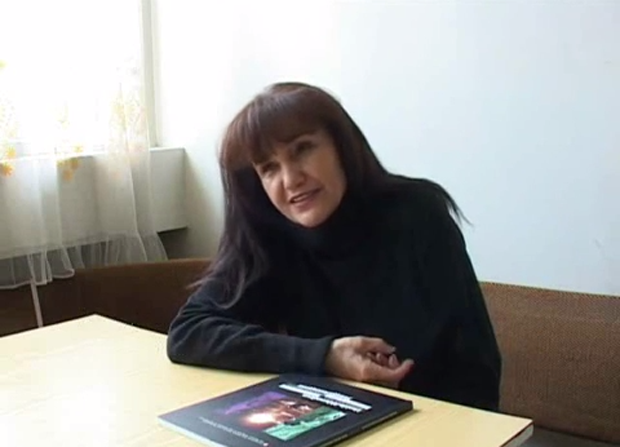
Umida Akhmedova (Image: Uznewsnet/YouTube)
Uzbek photographer Umida Akhmedova, whose work has been published in The New York Times and Wall Street Journal, was in 2009 charged with “damaging the country’s image” over photographs depicting life in rural Uzbekistan.
Al-Haj Ali Warrag, a leading Sudanese journalist and opposition party member, was in 2010 charged with “waging war against the state”. This came after an opinion piece where he advocated an election boycott.
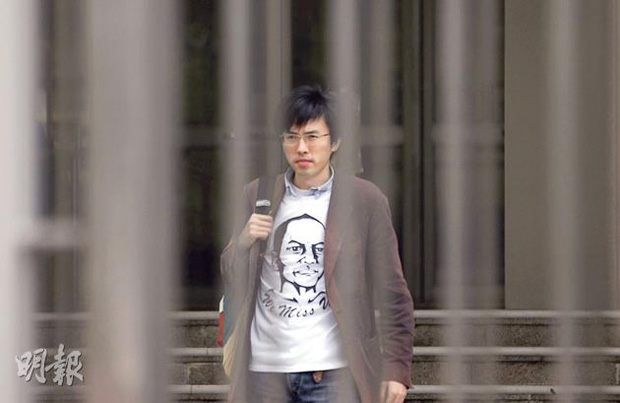
Avery Ng wearing the t-shirt he threw at Hu Jintao. Image from his Facebook page.
Avery Ng, an activist from Hong Kong, was in 2012 charged “with nuisance crimes committed in a public place” after throwing a t-shirt featuring a drawing of the late Chinese dissident Li Wangyang at former Chinese president Hu Jintao during an official visit.
Rachid Nini, a Moroccan newspaper editor, was in 2011 sentenced to a year in prison and a fine for compromising “the security and integrity of the nation and citizens”. A number of his editorials had attempted to expose corruption in the Moroccan government.
This article was originally posted on 17 June 2015 at indexoncensorship.org
Activist and blogger Raif Badawi was first arrested on 17 June 2012. Three years later he remains in prison on charges that are widely believed to be politically motivated.
Badawi had already spent almost two years in prison before being convicted in May 2014 for insulting Islam and founding a liberal website. He received a fine of 1 million riyals (£175,000) and a ten-year prison sentence. In addition, the court in Jeddah sentenced Badawi to 1,000 lashes.
On 9 January 2015, after morning prayers, Badawi was flogged 50 times. This punishment was due to continue every Friday until he has received a total of 1,000 lashes. However, subsequent floggings have not gone ahead, initially because Badawi was deemed not to have recovered sufficiently from the previous punishment. No explanation has been given for the postponement of further floggings.
Meanwhile, his lawyer and brother-in-law Waleed Abdulkhair, is serving 15 years in prison, for his peaceful activism.
Index on Censorship joins English PEN in calling for Badawi’s sentence of flogging to be overturned immediately, as well as for his conviction to be quashed and for him to be released unconditionally. We also call for the immediate release of Abdulkhair.
To mark the third anniversary of Badawi’s arrest, English PEN have organised a Day of Action which Index will join, as well as encourage our supporters to do so.
Deliver letter to Prime Minister
Join organisations and individuals actively campaigning for Raif Badawi’s release, including Baroness Glenys Kinnock, comedian Kate Smurthwaite and activist Peter Tatchell. You can read the full text of the letter and add your name here.
When: 2pm, Wednesday 17th June
Where: Downing Street
Public Meeting
Representatives of campaigning organisations will come together with experts on Saudi Arabia and MPs to discuss and consider how best to take the campaign forward.
When: 6.30pm, Wednesday 17th June
Where: Portcullis House
Take Action
We hope that activists across the UK and the world will join this Day of Action by holding events in your local area, lobbying the Saudi authorities, and sending messages of support.
Social media
Join the call for Raif Badawi and Waleed Abulkhair’s immediate release using the hashtags #FreeRaif and #FreeWaleed
You may also wish to include the following Twitter handles:
Send a letter of appeal
Write to the Saudi authorities (a sample letter is available below) – please cc: [email protected]
Sign petitions for his release
Sign Amnesty’s petition for Raif Badawi’s release, and call on the British Ambassador to Saudi Arabia to take urgent action
Send a message of support
If you would like to send a message of support to Raif Badawi and his family you can do so on Twitter (see above) or via email to [email protected]
Letter to the authorities
Send to: [email protected]
Your Excellency
I am writing to you as a supporter of English PEN, the founding centre of the international association of writers, to express serious concern for Raif Badawi.
According to PEN’s information, on 9 January 2015 imprisoned blogger Raif Badawi received the first round of 50 lashes in a public flogging after Friday prayers. Badawi is now due to receive 50 lashes each Friday until he has received 1,000 lashes, although subsequent floggings have not gone ahead.
Meanwhile, Raif Badawi’s lawyer and brother-in-law Waleed Abdulkhair, is serving 15 years in prison, for his peaceful activism.
I join PEN in calling for his sentence of flogging to be overturned immediately, as well as for Badawi’s conviction to be quashed and for him to be released unconditionally. I also call for the immediate release of lawyer Waleed Abulkhair.
I would welcome your comments on my appeal.
Yours sincerely
Nabeel Rajab, one of Bahrain’s leading human rights activists and the president of the Bahrain Center for Human Rights (BCHR), was set to deliver the following speech at the 2015 Oslo Freedom Forum. However, Rajab is currently imprisoned on spurious charges, including some linked to his tweets. Instead, the speech was read out by BCHR Vice President Said Yousif Almahafdah on his behalf.
My name is Nabeel Rajab, and I am writing you from my island country Bahrain, where I am in a prison cell. It was my intention to join you in person today at this exceptional forum and I was looking forward to meeting you human rights advocates and defenders of free expression, thought, and belief. However, I am now behind bars once again.
This is the fifth time that I am being jailed over the past four years. During most of my time in prison I have been completely isolated from the outside world. I am being punished not because I have committed a crime, but because I have defended the human rights of the oppressed and deprived ones, and because I have engaged in exposing the crimes of Bahrain’s rulers and the dictators of the Gulf region.
My people are still living under a repressive regime that rules with an iron fist. A regime that prevents journalists from exposing abuses and rampant corruption; a regime that stifles the voices of intellectuals and advocates of reform and democracy. We, as a nation, are prevented from having ambition, dignity, or even dreams of freedom. Dreams have become crimes in my country of Bahrain, which, on a per capita basis, has more prisoners of conscience than any other country in the world.
I do not want to focus on myself and the suffering that my family and I have gone through, I am just one of the innocent hundreds whose fate is to be behind bars or in exile, simply for speaking or writing about our suffering. Gulf states like Saudi Arabia, are only known for being rich in oil and gas, for possessing the largest arms market in the world and for their wealthy sheikhdoms who hold investments in Western countries. Very few people know or talk about the fact that there are thousands of political detainees and prisoners of conscience in these countries, or that these countries are great violators of human rights.
The reason for the absence of this painful truth is that our authoritarian regimes have profitable economic ties with Western governments. Democracies in the West help whitewash our regimes, in order to obtain a share of their oil wealth. Western politicians choose narrow economic interests over the human rights of millions of oppressed people in the grip of tyranny in Bahrain and beyond.
Dear friends, as you can see we are not just the victims of autocratic regimes, we are also victims of the democratic West, a democratic West that supports and empowers our regimes and equip them with the tools and weapons they need to repress our people.
Regimes like Bahrain are wealthy and very generous in buying the silence of democratic governments and their media outlets in exchange for contracts and investments. The time to say enough with the silence and hypocrisy has come! The time has come to tell Western governments, do not build your interests and luxury on our people’s misery. Please, consider that human rights should be the foundation of any commercial contract or economic interest.
We appreciate the global and Western commitment against militancy, extremism and terrorism, whose greatest ideological, social and financial incubator has been our region. However, we should not ignore the fact that one of the causes that leads to extremism is the absence of human rights, and the deprivation of any space for youth to express their aspiration for freedom, and the suppression of any calls for reform or opposition. Dissent has been crushed to such an extent in Bahrain that the place for our country’s dignitaries and reformers is now prison or exile. We cannot defeat extremism without promoting freedom, having free and open debates, and involving the people in decision-making. If this will not be done, all efforts to combat militant extremism are meaningless.
Dear attendees, you are the most influential people in the world, you are capable of helping us bring to our region the change that we seek. You can make those changes through what you say and what you write, or if you support civil society and human rights groups. Thus, you are in part morally responsible for supporting the human rights movement in my country Bahrain and in the entire Gulf region. I hope you can consider supporting human rights and pro-democracy activists who work day and night in risky and difficult circumstances. We call upon you to pressure Western governments to respect justice and human rights standards — the same human rights standards that you would work for within your borders.
One excellent example of this kind of support is the way the Norwegian government has sponsored this event. I thank the Norwegian government for giving me a platform to speak, as well as for demanding that my government release me. I also thank Norwegian civil society groups and all of the human rights defenders in the audience that, from across the world, are in this same struggle.
I hope to meet you all soon.
This speech was originally published by Bahrain Center for Human Rights.